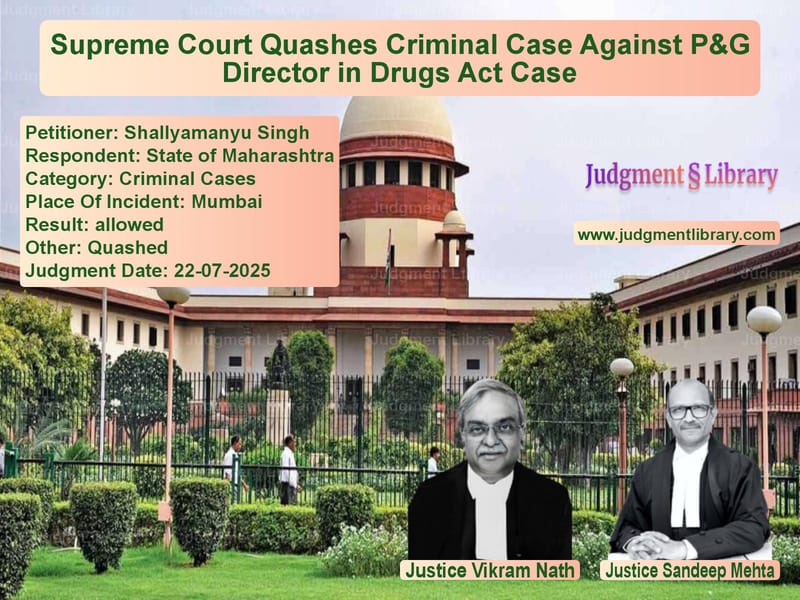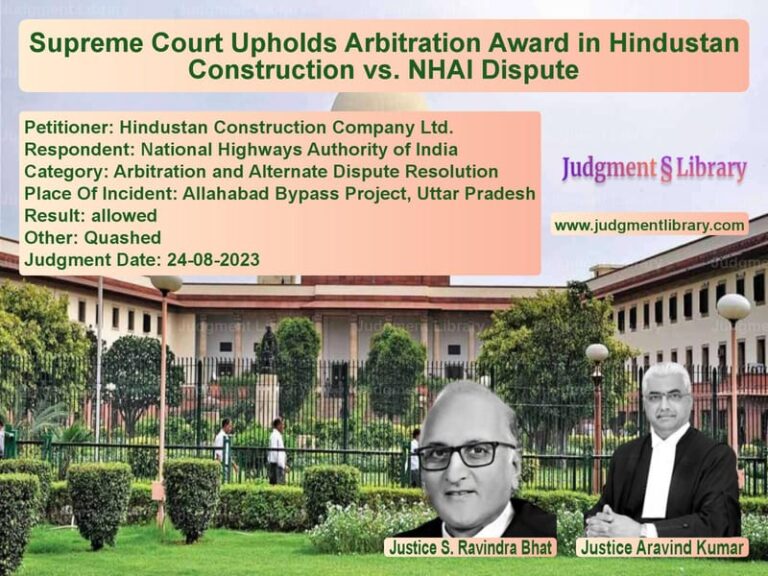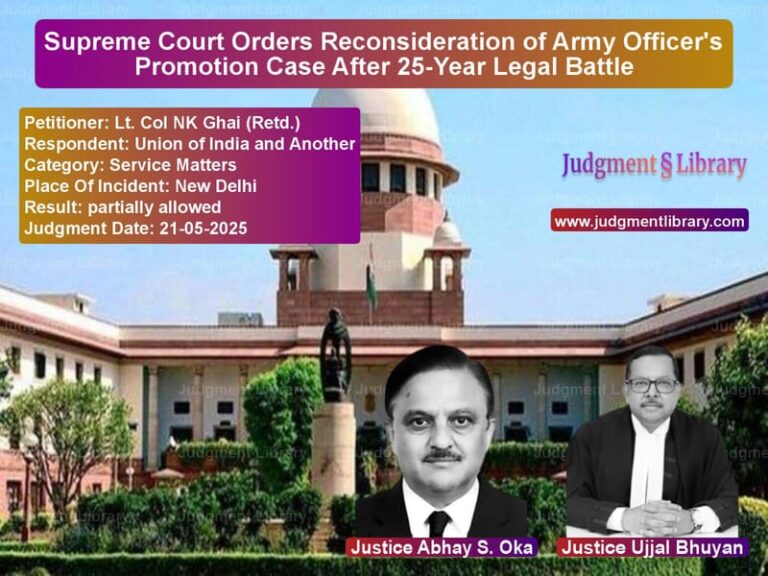Supreme Court Quashes Criminal Case Against P&G Director in Drugs Act Case
In a significant ruling that clarifies the boundaries of vicarious liability for company directors, the Supreme Court of India recently delivered a judgment that protects non-executive directors from automatic criminal prosecution for offenses committed by their companies. The case involved Shallyamanyu Singh, a director of Procter and Gamble Hygiene and Healthcare Limited, who faced criminal charges under the Drugs and Cosmetics Act, 1940, despite having no direct involvement in the alleged violations. The Court’s decision emphasizes that mere designation as a director cannot become a license for prosecution without specific evidence of active participation or neglect.
The Case That Started With Expired Medicine
The legal battle began when Drug Inspector officials discovered a stock of Vicks Multi Pain Relief Gel at the premises of M/s Action Soap Center in June 2016. The crucial detail was that the drug had already passed its expiry date of January 2016. According to the Standard Operating Procedure of P&G Ltd., drugs set to expire within six months were required to be destroyed, and the company had indeed initiated the process of recalling and destroying the batch in question back in May 2015. The investigation revealed that the drug had been procured from P&G Ltd., and further inquiry showed that the distribution had been made to M/s Star Express, an enterprise that did not possess a valid license under the Drugs & Cosmetics Act.
The Legal Battle Unfolds
Following the investigation, the Drug Inspector filed a complaint in the Court of Metropolitan Magistrate, Mazgaon, Mumbai, naming multiple accused including Shallyamanyu Singh as accused No. 6 in his capacity as Director of P&G Ltd. The Magistrate took cognizance of the offenses and issued process against all accused, including the appellant. The specific allegations against the appellant in the complaint stated that “Accused No.6 and 7 distributed drugs for the purpose of sale and distribution to M/s. Star Express, Navi Mumbai who is not holding any requisite license under Drugs and Cosmetics Act. 1940.” This led the appellant to approach the High Court of Bombay seeking quashing of the proceedings under Section 482 of the Code of Criminal Procedure, which was rejected, prompting the appeal to the Supreme Court.
The Arguments Before the Supreme Court
Mr. Sidharth Luthra, learned senior counsel appearing for the appellant, presented compelling arguments before the Supreme Court. He vehemently argued that “the High Court fell in grave error by holding that the averments made in the complaint and the supporting material are sufficient to invoke the mischief of Section 34(2) of the D&C Act thereby validating the prosecution of the appellant.” He emphasized that “there is no averment whatsoever that the Drug Inspector had made any inquiry/investigation in relation to any Director (including the appellant), Manager, Secretary, or other responsible Officer of the company (accused No. 7), with whose connivance or neglect, the alleged offence was committed.” Crucially, he pointed out that “as per the communication issued from the Registrar of Companies, the appellant was a Non-Executive Director in the company and hence, to hold the appellant as vicariously liable for the alleged offence in the capacity of the person in-charge of P&G Ltd. (accused No. 7) is uncalled for.”
On the other side, Ms. Rukhmini Bobde, learned counsel for the respondent-State, defended the prosecution arguing that “by virtue of the aforesaid provision, any Director who is responsible for the conduct of business of the company can be held vicariously liable and made to face prosecution for the acts/omissions by the company leading to the commission of offence/s under the provisions of the D&C Act.” She contended that “the appellant responded to the show cause notice of the Drug Inspector in the capacity of the Director of the company, hence, the arraignment of the appellant was logical and justified because it is he who was having exclusive knowledge about the functioning and business of the company.” She further argued that “the appellant’s contention that he was not responsible for the day-to-day affairs of the company can only be agitated as a defence when evidence is recorded at the trial.”
The Court’s Legal Analysis
The Supreme Court conducted a detailed examination of Section 34 of the Drugs & Cosmetics Act, which deals with offenses by companies. The Court noted that “Section 34(2) begin with a caveat, that the prosecution would be required to provide proof regarding the active involvement of the Director or person concerned in the affairs of the company which would justify drawing an inference about his/her inculpability.” The Court emphasized that “while fastening the criminal liability, there is no presumption that every Director knows about the transactions of the company. Criminal liability can be fastened only upon those directors or persons, who, at the time of the commission of the offence, were in-charge of and were responsible for the day-to-day business of the company.”
The Court made a crucial distinction between Section 34(1) and Section 34(2) of the Act, noting that “every person who is in-charge of the day-to-day affairs of the company would be liable to face prosecution under the Act. The Director or Directors, other than the one who is in-charge of the day-to-day affairs of the company can also be prosecuted ‘where it is proved’ that the offence has been committed with the consent, connivance or is attributable to any neglect on the part of such Director.”
The Court’s Critical Findings
In its analysis, the Court found fatal flaws in the prosecution’s case against the appellant. The judgment noted that “the complaint in the present case is totally silent on this vital aspect” regarding the active involvement of the appellant. The Court rejected the High Court’s reasoning that certain paragraphs in the complaint sufficiently implicated the appellant, stating that “the said finding is erroneous on the face of record. The allegation of distributing the drugs to an enterprise without a license is omnibus against both i.e., accused No. 6 (appellant) as well as against accused No. 7 (P&G Ltd.) and thus, something more than a bald allegation is required which satisfies the necessary ingredients of the offences under the D&C Act, to make the appellant vicariously liable for the acts and omissions of the company.”
The Court made a significant observation about the prosecution’s approach: “It is observed that neither of the Director, Manager or any other officer in-charge of the company (accused No. 7) has been impleaded in the complaint by virtue of procedure provided under Section 34(1) of the D&C Act.” The Court further noted that “the complaint itself makes no reference whatsoever to the aforementioned communications exchanged between the Drug Inspector and the P&G Ltd. We may also note that the complaint is totally devoid of averments regarding any inquiry into the role of the Directors of the P&G Ltd. (accused No. 7) or the person/s responsible for the conduct of the day-to-day business of P&G Ltd. (accused No. 7).”
The Final Ruling and Its Implications
In its concluding remarks, the Supreme Court delivered a strong message about the misuse of legal processes against company directors. The Court held that “prosecution of the appellant herein on the anvil of vicarious liability simply being a Director of the company is absolutely unjustified and tantamounts to a gross abuse of the process of law.” The Court allowed the appeal and quashed the summoning order and all proceedings against the appellant, while allowing the case to continue against the other accused.
This judgment serves as an important safeguard for non-executive directors and professionals who serve on company boards without involvement in day-to-day operations. It establishes that criminal liability cannot be automatically imposed based solely on designation and requires specific evidence of active participation, consent, connivance, or neglect. The ruling reinforces the principle that while companies can be held liable for statutory violations, the prosecution of individual directors must be based on concrete evidence of their personal involvement rather than their formal positions within the organization.
Petitioner Name: Shallyamanyu Singh.Respondent Name: State of Maharashtra.Judgment By: Justice Vikram Nath, Justice Sandeep Mehta.Place Of Incident: Mumbai.Judgment Date: 22-07-2025.Result: allowed.
Don’t miss out on the full details! Download the complete judgment in PDF format below and gain valuable insights instantly!
Download Judgment: shallyamanyu-singh-vs-state-of-maharashtra-supreme-court-of-india-judgment-dated-22-07-2025.pdf
Directly Download Judgment: Directly download this Judgment
See all petitions in Fraud and Forgery
See all petitions in Corporate Compliance
See all petitions in Legal Malpractice
See all petitions in Other Cases
See all petitions in Judgment by Vikram Nath
See all petitions in Judgment by Sandeep Mehta
See all petitions in allowed
See all petitions in Quashed
See all petitions in supreme court of India judgments July 2025
See all petitions in 2025 judgments
See all posts in Criminal Cases Category
See all allowed petitions in Criminal Cases Category
See all Dismissed petitions in Criminal Cases Category
See all partially allowed petitions in Criminal Cases Category







